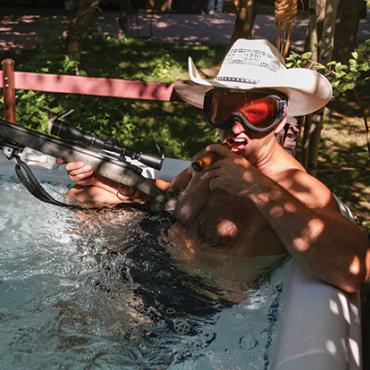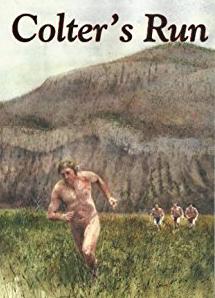Colter's Great Escape
By the skin of his teeth.
In the summer of 1806, not long after passing through the Gallatin Valley, the Lewis & Clark expedition came across a small camp on the Missouri River belonging to a pair of fur-traders from Illinois. With promises of great wealth, the two trappers persuaded John Colter, Lewis & Clark's distinguished hunter and guide, to leave the expedition and join them on a beaver-trapping foray up the Yellowstone River. Because of Colter's excellent service record and the general magnanimity of Lewis and Clark, Colter's request for discharge was granted. With a few necessary supplies, his rifle, and plenty of ammunition, Colter bid Lewis & Clark farewell, and began the life of exploration and adventure that was to become legendary throughout the Rocky Mountain West.
Of John Colter's many, oft-recounted adventures, one particular run-in with the Blackfeet Indians stands out as singularly representative of the spirit, stamina, and courage of one of the West's first true frontier heroes:
Not long after parting company with the two trappers from Illinois, Colter teamed up with a man named John Potts. The two were checking their traps one day, on the Jefferson River just below present-day Three Forks, when they heard, above the high banks of the river, the movement of hundreds of hooved animals. Colter believed it to be Indians, and so advised retreat; but Potts declared it buffalo, calling Colter a coward and demanding that they press on. After a few minutes, several hundred mounted Blackfeet warriors appeared on the bank, beckoning them ashore. As it was too late to escape, and as Colter suspected merely robbery, he surreptitiously dropped his traps overboard into the shallow water and rowed ashore, advising Potts to do the same. When they landed, one of the Blackfeet grabbed Potts's rifle; but Colter immediately snatched it back and returned it to Potts, who, against Colter's urgings, paddled back out into the middle of the river.
Suddenly an arrow struck Potts. He cried to Colter that he was hit, and then fired upon a Blackfoot, killing him. At that, all the Blackfeet turned their weapons on Potts and riddled him with arrows and bullets. As he collapsed, dead, the warriors seized Colter, hauled him back to their camp, and stripped him naked. They began to discuss just how they would kill him. Various methods were suggested, but they all had one element in common: each would be very slow and very painful.
Now Colter had spent much time with the Crows and the Flatheads, and he knew well the ways of their mutual enemy, the warlike Blackfeet; so when the chief asked him if he could run fast, Colter responded no, he was rather slow, as a matter of fact. With that, the chief announced that he'd made a decision: their prisoner would be released and chased down as a prize for the swiftest warrior. He took the naked Colter out into a field 300 yards away, and told him to escape if he could.
Colter took off across the plain toward the Madison River, trying to ignore the pain from the abundant prickly pear as it pierced his bare feet. He ran with such desperate speed that three miles later, when he finally dared to look behind him, he was surprised to see that he had outdistanced all the Blackfeet warriors save one. His sole assailant carried a short spear, and had a blanket draped over his shoulder.
After another mile or so, Colter had so pushed his body to its limits that his nose began to bleed in spurts, the blood spilling out onto his chest and shoulders. Another look back revealed the warrior just twenty yards away. In desperation Colter turned around, spread his arms, and cried out his fiercest challenge. Whether the brave was startled by Colter's bloody appearance, or merely exhausted himself, is unknown; but as he reared back to throw the spear he tripped and lurched forward, off balance. Colter grabbed the pointed end, breaking it off as the Blackfoot fell to the ground past him, and drove it through the warrior's back with such force it penetrated the earth beneath him. Without a moment's hesitation Colter snatched up the blanket and continued his flight toward the river.
Reaching the water's edge, he plunged in and swam toward an island downstream, where he slipped under a huge pile of driftwood that had lodged itself on the island's upper end. After several attempts he broke open a small space where he could both breathe and hold himself against the current. There he waited, and soon the rest of the Blackfeet warriors arrived at the river. They patrolled the banks for hours, many of them swimming out to the island and searching it as well. Colter watched them through the cracks in the driftwood, hoping that the warriors would not suspect his hideout and set the pile aflame.
When night fell, Colter slipped out from beneath the driftwood and floated downstream. After a while he swam ashore and, with the blanket his sole protection from the elements, began his journey toward friendly ground: Manuel Lisa's fort on the Big Horn River, 250 miles away.
Eleven days later, bearded, emaciated, and bloody, John Colter limped into Fort Lisa, carrying only the blanket and the spear-half he had used to reclaim his life.







